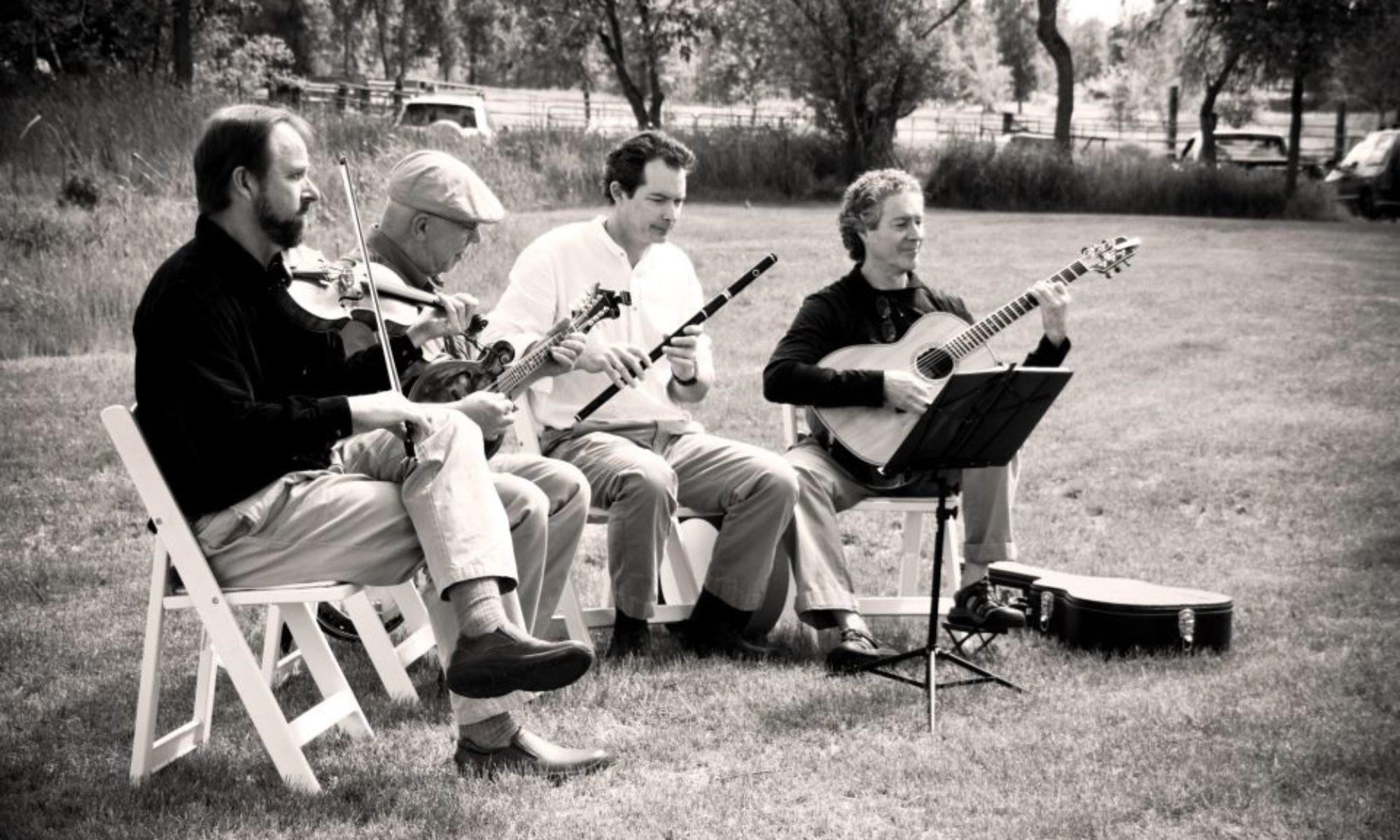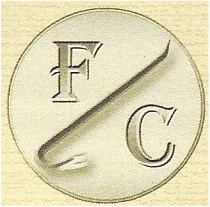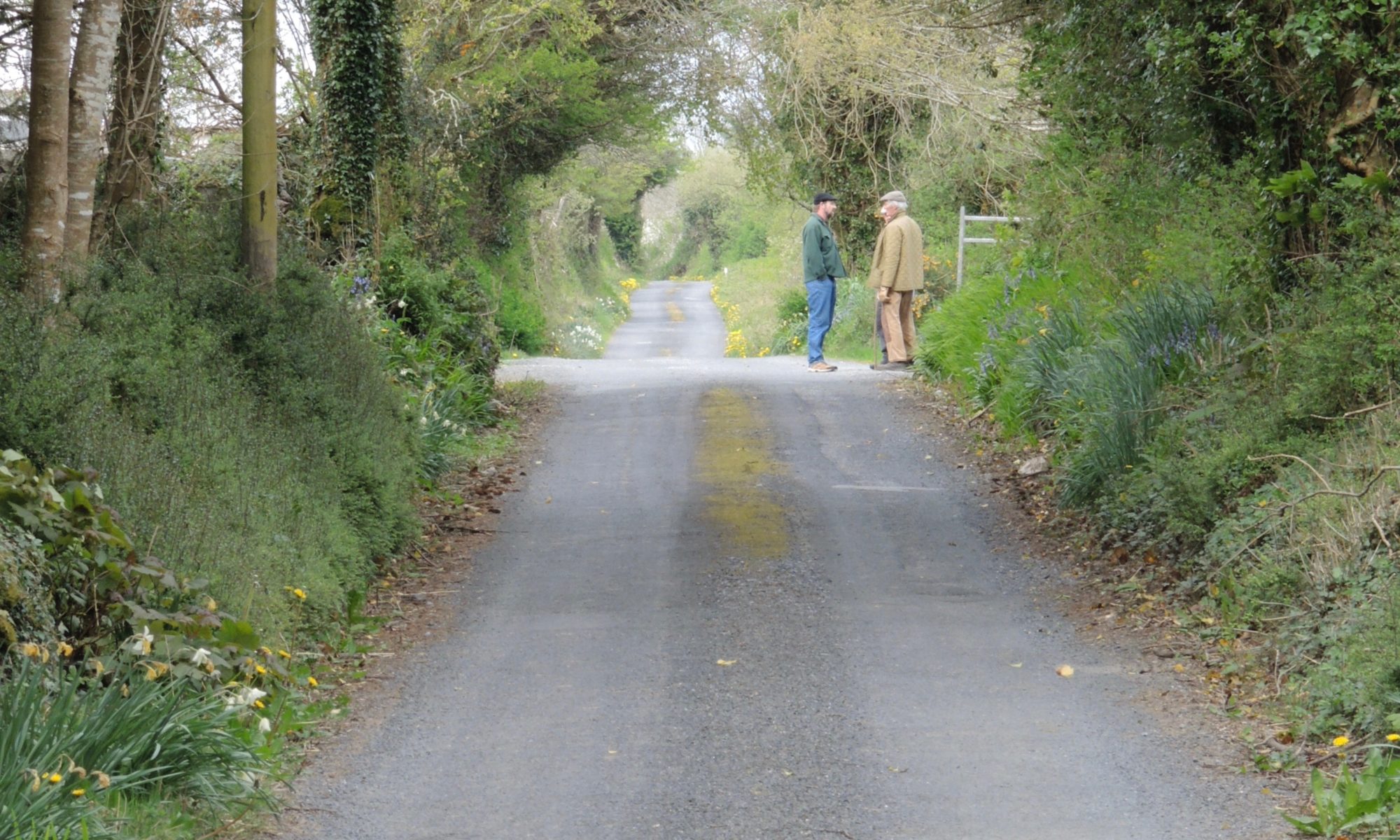In making this recording, we decided to prioritize trying to capture the energy we aim for when we play live. It is a studio recording, but the basic tracks of all the instrumental selections were done playing together in the same room, without separation, without headphones, just rolling the tape (or whatever the digital equivalent is) and playing. We generally did three or four takes of each set of tunes and then picked the best. Other instruments, such as bodhrán or pipes, were added to the mix after we did the base recording. Recording the songs is a somewhat different process, as the vocals need to be recorded separately from the instruments. Certain “bits of tarnish” were left for the sake of honesty, as that was the best take we could get. We think the result captures the energy of our group dynamic, and sounds like us on a good night. We hope you enjoy it!
Below, you’ll find short excerpts from each piece, along with credits and notes about the tunes and songs. For dancers, we have included the tempo (beats per minute) after each of the instrumental tracks.
1. Jigs: Down the Back Lane, Castlebar Races, Dinny Delany’s (129 bpm)
Rick: guitar -James: flute, bodhrán, whistle, uilleann pipes – Morgan: fiddle – Don: mandolin
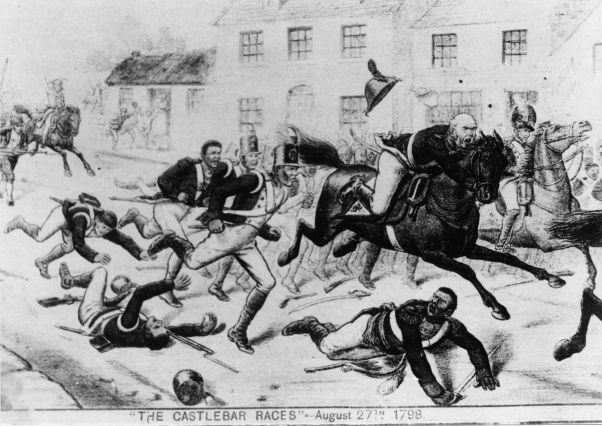
We play most of the sets in our repertoire for quite a while before deciding to record them. This jig set is an exception. We put these three tunes together for the first time in a warm up session right before recording them, it worked and we’re pleased.
Down The Back Lane appears to be an old tune. It’s in Brendan Breathnach’s Ceol Rince na h’Eireann, Vol. 1, # 6. It’s a forceful, driving tune.
Castlebar Races was recorded in New York in 1922 by County Sligo fiddler James Morrison, as the second tune paired with Mist on the Meadow, but we’re not sure how old the tune actually is. As the story is told, French troops came to the aid of the Irish rebels in the uprising of 1798. In August of that year, six thousand English troops were stationed on the outskirts of Castlebar, Co. Mayo. Two thousand French and Irish troops attacked them from an unexpected direction. The resulting rout of the British set off a hasty and panicked retreat through the town which the locals dubbed “The Castlebar Races”. Knowing that history definitely effected our interpretation of the tune infusing it with a joyous and galloping quality.
Dennis “Dinny” Delaney (1836-1919) was a blind piper, and colorful character, from Ballinasloe, east Galway, who recorded the last tune on a wax cylinder in 1902. It’s a rousing final tune to the set. Dinny’s biography can be found here. It’s worth reading…
2. Reels: The Noisy Curlew, Kitty Gone a Milkin’, Music in the Glen (110 bpm)
Morgan: fiddle – James: flute, bodhrán – Don: mandolin – Rick: guitar
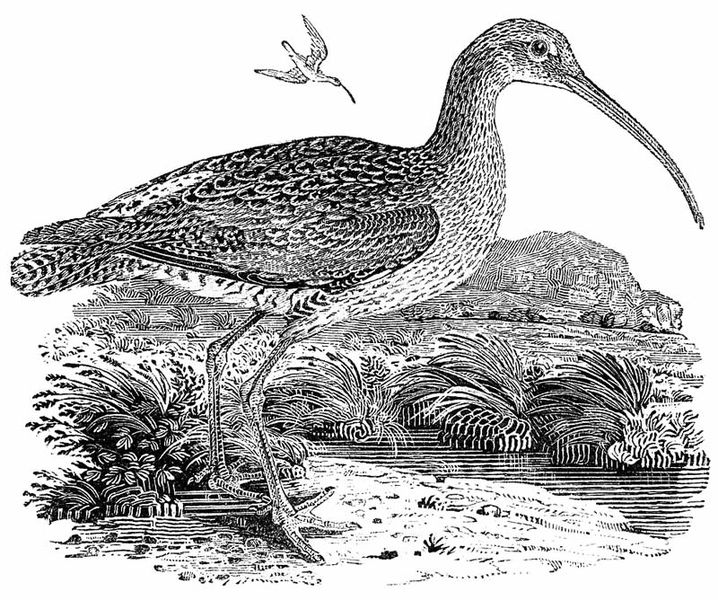
Noisy Curlew has been recorded by Sligo/London flute-player Roger Sherlock as Jack Maguire’s. The earliest recording of it is 1974, so it appears to be a fairly modern tune. We got it from Verena Commins and Julie Langan’s fantastic album, Fonnchaoi. Julie is a wonderful fiddler and has become a good friend. And she would probably not want us writing things like “fantastic” and “wonderful” about her and her music, but it’s true!
Kitty Gone a Milking, AKA, Katie Gone A Milking, has also been known in County Clare as The Long Hills of Mourne. It appears in the Goodman Manuscripts which date from the mid 1800’s. The earliest recording of it is County Meath fiddler Frank O’Higgins in 1938.
Music In The Glen is another classic, very often played with Kitty. The tune was originally given to Francis O’Neill in the key of A by tipperary fiddle player Edward Cronin.
It’s easy to feel good when playing this set.
3. Song: I Loved a Lass
James: flute, vocals – Morgan: viola, fiddle – Don: mandolin – Rick: guitar, background vocals
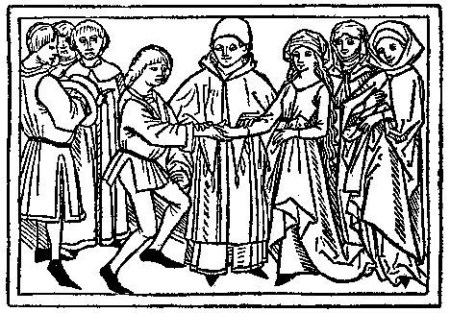
This sad tale of unrequited love is Scottish in origin and was first published in a song collection in 1670, and could be much older.
James heard Ewan McColl’s version in the early 1990s and has wanted to sing it ever since, but the right moment didn’t present itself until now. When he first brought it to the lads, Rick was all for it (he and James have a passion for dark songs), but Morgan and Don thought it bordered on, well, the melodramatic. And it does, being one of those “if I can’t have my love, I’ll just go to sea/die/join the King’s army” kind of ballads. But the imagery of ships in the forest is stunning and unexpected, and makes up for the self-pity of the unrequited lover.
Lyrics:
I loved a lass and I loved her so well
That I hated all others who spoke of her ill.
But now for my love she’s rewarded me well ,
She’s gone to be wed to another.
When I saw my young love to the church go
And with groom and bridemaidens she made a fine show.
I followed behind with my heart full of woe
For soon she’d be wed to another.
When I saw my young love sit down to dine.
I came up beside her and poured her some wine.
And I drank to that lassie who should have been mine,
But now she is wed to another.
Now the men of the forest they ask it of me,
“How many strawberries grow in the salt sea?”
I answered them with a tear in my eye,
“How many ships sail in the forest?”
Now go dig me a grave, and dig it so deep
And cover me over with flowers so sweet.
And lay me down for to take a long sleep,
And maybe in time I’ll forget her.
So we dug him a grave, and dug it so deep
And covered him over with flowers so sweet.
And we laid him down for to take a long sleep,
And maybe by now he’s forgot her.
4. Jigs: The Woodcock, Drummond Castle, The Kerfunten (118 bpm)
The Woodcock and Kerfunten by Hammy Hamilton
Don: mandolin – Morgan: fiddle – Rick: guitar – James: flute, bodhrán
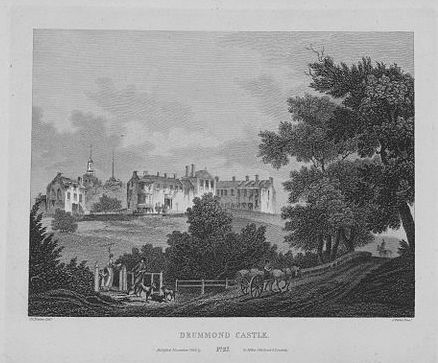
The first and last Jigs in this set were written by Hammy Hamilton the great flute player and flute maker from Belfast, who lives in Cúil Aodha (Coolea), Co. Cork. Of the tunes, Hammy says:
“The Kerfunten was the first and I wrote it while teaching at a workshop in Brittany. It was in a suburb of Quimper called Kerfunteun–hence the name. The spelling seems to have gotten a bit mixed up over the years, though! I think the spelling with the u is the correct one. There was a guitar player there, who was also teaching, and he was messing about one day, playing a chord sequence, I picked up a whistle, and began fitting a tune around them. Ten minutes later it had evolved into the Kerfunten Jig! The Woodcock I wrote some years later–I’m not exactly sure when, but it was sometime in the 1980s. I was looking for another tune to put with it and I remembered the other jig. There was something about the combination that people seemed to like, and by the early 1990s the set had become really popular. It still gives me a buzz to walk into a pub and hear those tunes being played. I called the second tune the Woodcock because there was something about the way the melody swerved about which reminded me of the way a woodcock flies when it is put up by a dog.”
The middle tune we first heard played by Julie Langan in a session in Westport, Co. Mayo. Her spirited rendition inspired us to want to play it. It turns out that it appears in the Drummond Castle Manuscript, “A Collection of Country Dances written for use of his Grace the Duke of Perth by Dav. Young, 1734.” Niel Gow, he of the lamented second wife, published the tune in his Second Collection in 1788.
All three tunes, though hardly lacking in drive, also have an inherent delicacy to them, which has certainly influenced our approach to the set.
5. Reels: The Rookery, The Phoenix, Fred’s Favorite (107 bpm)
The Phoenix (Dave Hennessy) – Copyright Whinney-The-Tunes o/b/o Little Rox Music
James: flute – Morgan: fiddle – Don: mandolin – Rick: guitar
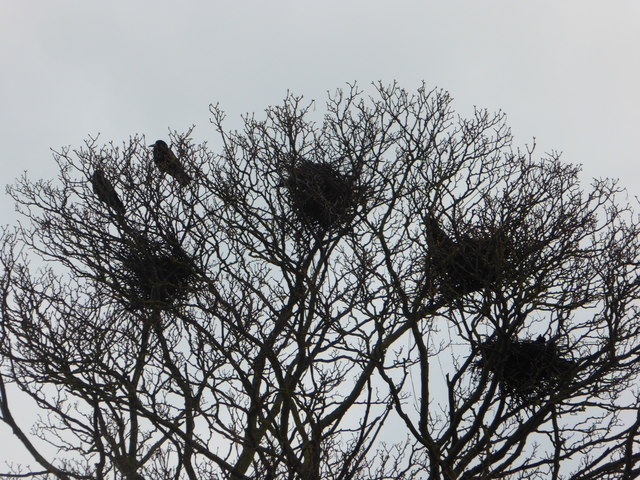
The Rookery was written by Vincent Broderick, the great Galway flute player and composer; The Phoenix by Cork accordion player Dave Hennessy, (and named after a pub on Union Quay in Cork City), and Fred’s Favorite by Peter Mohan, a musician and coincidentally the founder of Phoenix Alchemy, a leadership consultancy in Dublin.
These tunes just beg for a strong, bouncy swing feel, so we play them a little slower than some of our other sets of reels. As Don often reminds us: “There’s nothing wrong with that!”
6. Jigs: Helvic Head, The Humours of Ballyloughlin (111 bpm)
Rick: guitar – James: flute – Morgan: fiddle – Don: banjo
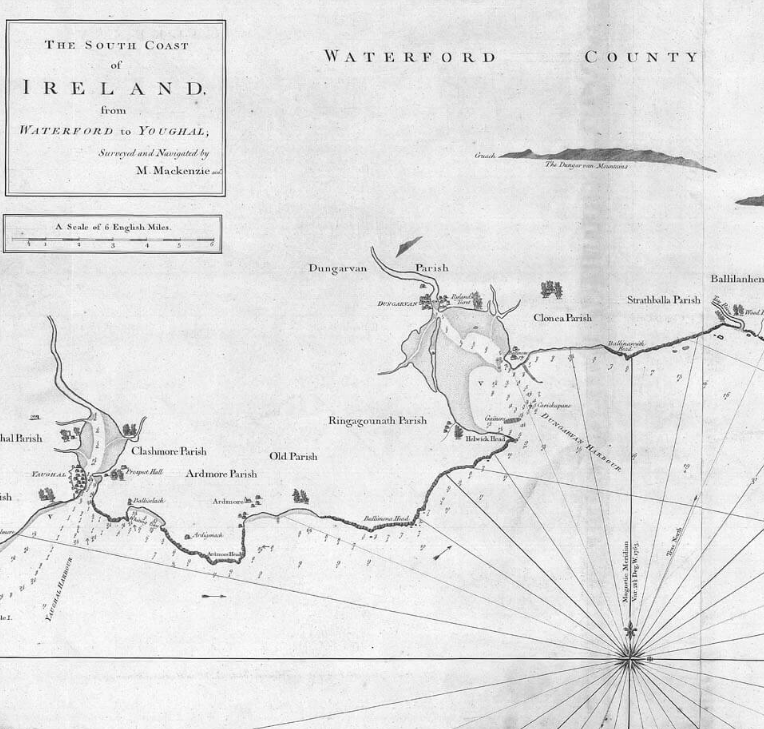
These are two very old and well-known jigs.
Rick starts this set, flat picking the melody on guitar as the other instruments join in one by one. Rick says: “When we first started playing Helvic Head I fell in love with it. For me it’s one of the majestic or mighty tunes of the repertoire. We played it for our listeners and their responses assured its permanence in our set list. In December of 2018, I gave myself a Christmas present by learning to flat pick the melody on guitar in DADGAD tuning. I sprung it on my bandmates at a gig one evening, they loved it and we arranged it as you hear it here.”
Don plays banjo on this piece – the only one on the album. This is partly because he acquired three new mandolins this year and was very reluctant to put them down! (But if you’d like to hear more of his banjo playing, there’s plenty on our other recordings!)
7. Song: John’s Lament
Words and music by Rick Rubin; arrangement by Rick Rubin and Floating Crowbar
Rick: guitar, vocals – James: low whistle – Morgan: fiddle – Don: low whistle
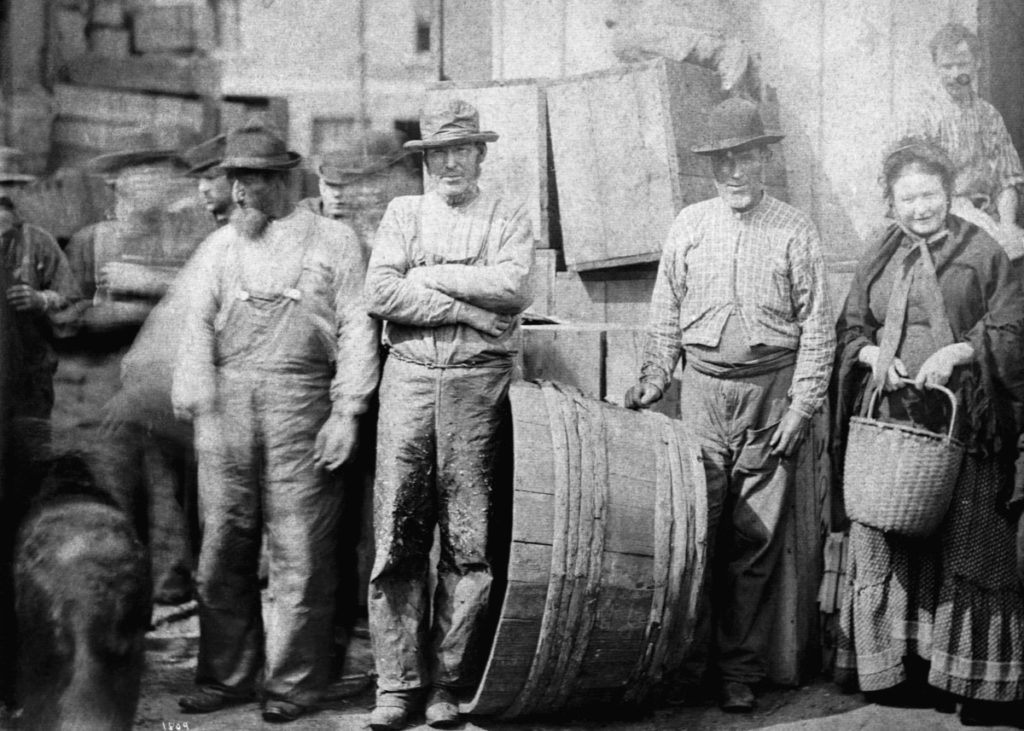
“I wrote the first draft for this song in 2013. For years I’d been feeling the slow, rising creep of inequity and general unfairness in the USA. I came of age in the 60’s when, despite the turmoil of that era, there was a sense of optimism and promise of better times. Then came the 70’s, Nixon culminating in Reagan and the backlash against the liberalization of the 60’s. Greed became enshrined in legislation which has led us to the current state of affairs. There had been a time in the 1950’s and 60’s when times were better, not for everyone – we were never that fair of a country – but the differences weren’t so stark and there was a functioning middle class. This song is my homage to the working men and women of the world and a warning to our exploiters.
At first I found it difficult to perform this song. The feelings I channeled left me feeling raw and vulnerable. I would pull it out sporadically at gigs and play it solo then put it away for months. At one of our favorite sessions at The Cobbler, Westport, Mayo in 2018 I allowed myself to really feel the writing and sing it full throttle, and was surprised and gratified at its reception. At one point I forgot part of the lyrics and Dan Delaney and Johnny Fadgin jumped in with the la la’s – at which point, all the session players and pub patrons joined in until I found my place. We decided to include the la, la’s in memory of that night.” (Rick)
Lyrics:
My name, it is John, like my father’s before me
Been a working man most of my life.
By my family I’ve stood with my toil and my strife,
And if you doubt me then just ask my wife.
I’m not generally loud yet I’ve always been proud
of my family, my country and friends.
I remember the smiles but it’s now mostly shrugs
Factories shuttered the good times did end.
I look around and just don’t understand
how our country fell into this state.
A few decades ago we all spoke about love
now it’s mostly just anger and hate.
Well I’m not one to envy, let a man have his due
If he earns a good living so what,
But to buy out a business just to steal all the funds
Now that’s something that I’ll never get.
There were families and children who’s need is so great
More than them with their houses and planes.
When their husbands and fathers came home in distress,
The joy turned to nothing but pain.
How much does it take just how much is enough,
Do the big walls and gates serve you well?
Did you smile as we scraped out the door the last time?
If you did, well then damn you to hell!
You take a man’s wages and leave him in shame
then offer his job overseas.
Then you tell him he’s selfish and stupid and wrong
That it’s business just business you see.
Its the way of the world to get kicked to the curb,
and be tossed like a cork in the sea,
Look up from your counting, you’ve blood on your hands
You’ll get your rewards wait and see.
There’s strength in numbers, let sleeping dogs lie
When they wake they may do more than growl.
For the chewing of bones helps to sharpen the teeth
When they clamp on your leg you will howl!
8. Jigs: The Luck Penny/The Far Isle/The Boys of South Hill (118 bpm)
The Far Isle & The Boys of South Hill by Morgan Andersen
Morgan: fiddle – Don: mandolin – Rick: guitar -James: flute

Horse and livestock fairs have been around for centuries and still are a feature of Irish life. It is said the “luck penny” is an additional one penny price given back to the seller “for luck” to seal the deal on the cost of a horse. Another variation is the penny is given to the buyer, and another is that the the buyer and seller each spit into the palm of their hands and then shook to finalize the deal, and that was the original Luck Penny! Feel free to choose which story you prefer. We’re not sure if the “luck penny” was added to the sale of sheep, cows, pigs, or cars! It’s a beautiful jig and skillfully written. It was first printed in 1850.
Morgan came up with The Far Isle while thinking about an island which he loves and once lived on. Unfortunately it proved to be too far away to spend as much time there as he would like. The same sentiment of being too far from an island where we want to spend more time also applies to Ireland, for all the members of Floating Crowbar, so the title has a double meaning.
The set ends on a more joyous note with another of Morgan’s tunes, The Boys of South Hill. While the islands are still in his blood, had he stayed there he would not have met Don, James, and Rick, who all live in the South Hill neighborhood of Spokane. That meeting has proven to be one of the most fun, rewarding, and significant of his life. (We know giving up your island dream was difficult, Morgan, but we are so glad you came our way!)
9. Slow reel: Paddy Fahey’s (60 bpm)
James: low whistles – Morgan: viola, fiddle, octave mandolin – Don: flute – Rick: guitar
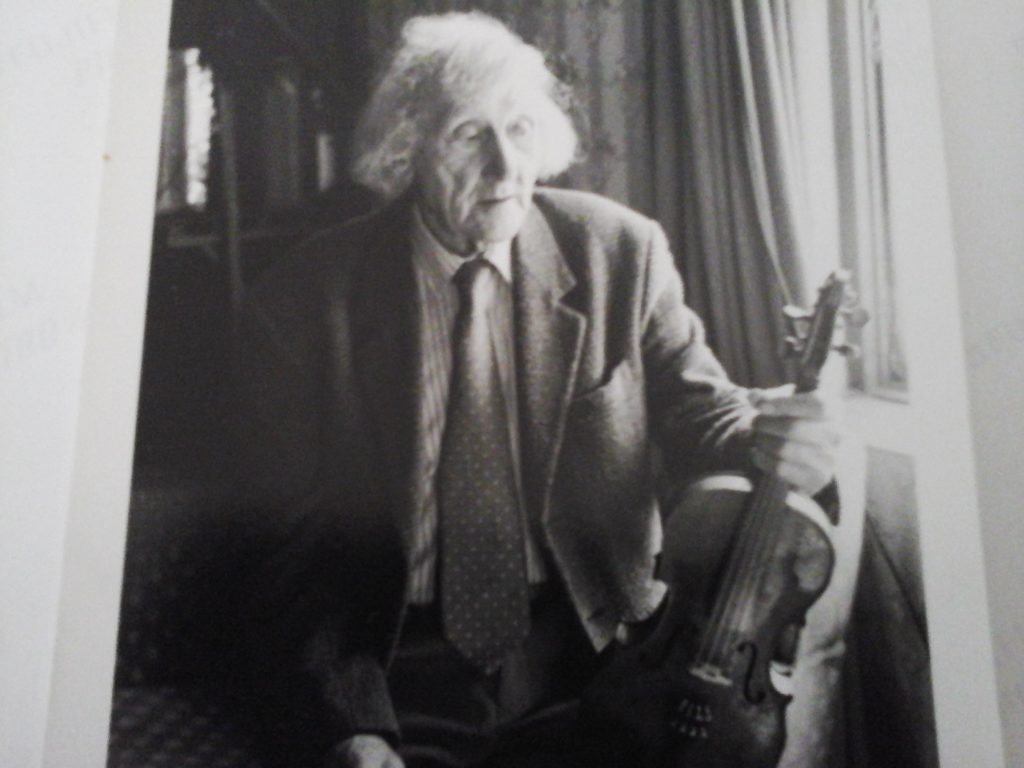
The tunes written by Paddy Fahey have become a permanent part of the repertoire of modern Irish traditional music. His melodies are some of the most arresting and beautiful in a repertoire full of beautiful melodies. Paddy didn’t title any of his tunes; instead they’re referred to as Paddy Fahey’s Reel/ Jig/etc.
In 1995, a University of Limerick Master’s student called Maria Holohan made recordings of Paddy playing his tunes in the 1990’s for her dissertation titled The Tune Compositions of Paddy Fahey. To date, it’s the only attempt to document and codify his compositions, but unfortunately her thesis is no longer available. She created a numbering system not favored by Paddy himself but which has proved useful nonetheless. The reel we’ve recorded is number 4 in her work. Paddy plays it in reel tempo, and without the flattened 7th, but we chose to slow it down: the slower tempo reveals the architecture and beauty inside this gem. We had chosen this to be on the album before we heard of Paddy’s passing (on May 31st, 2019).
Maith thú, Paddy.
10. Song/Waltz: Right Tearnin’/Dympna’s
Don: mandolin, background vocals – Rick: guitar, background vocals – Morgan: fiddle – James: bodhrán, percussion, vocals, flute
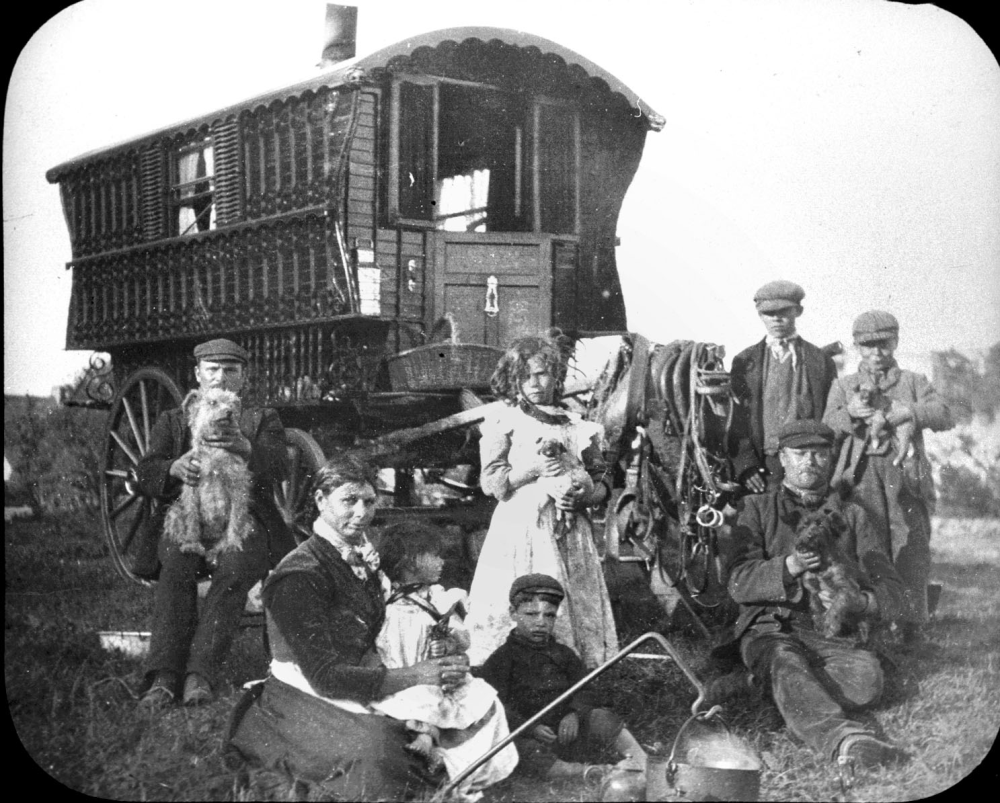
We heard the song Right Tearnin’ at a session in Jordan’s (Clarinbridge, Co. Galway) in 2016 and immediately fell in love with it. The song names so many places that we’ve visited on our trips to Ireland that we felt an instant connection – and took one small liberty with the lyrics to include Kilgarvin, Co. Kerry, where we enjoyed a mighty session on our first trip to Ireland together in 2012. The song was written by the late Tony Small, the brother of the wonderful Jackie Small, a musician in Westport, Co. Mayo with an encyclopedic knowledge of the tradition. Jackie told us Tony was inspired to write it after a conversation he had on a train with a man who was a Traveler.
Another brilliant musician in north Mayo we have been fortunate to meet and to play in sessions with is a box player named Joe Carey. Rick and Morgan also had the pleasure of playing with Joe and Julie Langan at the wedding of Joe’s son.
Not long after coming home from the trip on which we first met Joe, we were working on some new tunes to play at dances. Don brought Dympna’s Waltz to our attention, a tune which he had heard on a recording of the concertina player Dympna O’Sullivan. We all took to it right away. It was only after adopting it that we learned it was written by none other than Joe Carey! Connections of that type tend to make us feel like this was music we were meant to play.
Lyrics:
I will not speak unkindly of solder and tin,
Of the great traveling craftsmen John Martin and Jim,
Not lazy or polished like some settled men,
Who envy our freedom our ways and our women.
Right Tearnin’, Right Tearnin’, Tearnin’ away!
There’s a fair in Belaghy this fine summer’s day
Farewell to the Coveys ‘round Westport Mayo,
We’ll travel through Shamtown to Ballinasloe,
To the walled town of Galway then southward Hooray!
We’ll speed through the Banner to Miltown-Malbay.
We’ll deal at the Spancil and then we’ll head south
To the Kingdom of Kerry, Kilgarvin [Kilorglin] no doubt,
We’ll talk of our travels with our own kith and kin
Aunts uncles and cousins, there’s hundreds of them
Right Tearnin’ full Tearnin’ Tearnin’ away!
There’s a fair in Belaghy this fine summer’s day.
We’ll make no great hurry North Kerry or Clare,
There’s no need to worry we always get there,
To fulfill the promise we’re destined to go,
To spend the wild winter on the bogs of Mayo.
Right Tearnin’ Right Tearnin’ Tearnin’ away!
There’s a fair in Belaghy this fine summer’s day.
11: Slides: Scartaglen/The Cat Jumped into the Mouse’s Hole and Didn’t Come out till Morning/Padraig O’Keeffe’s (140 bpm)
Morgan: fiddle – Don: mandolin – Rick: tenor guitar – James: whistle, flute, bodhrán
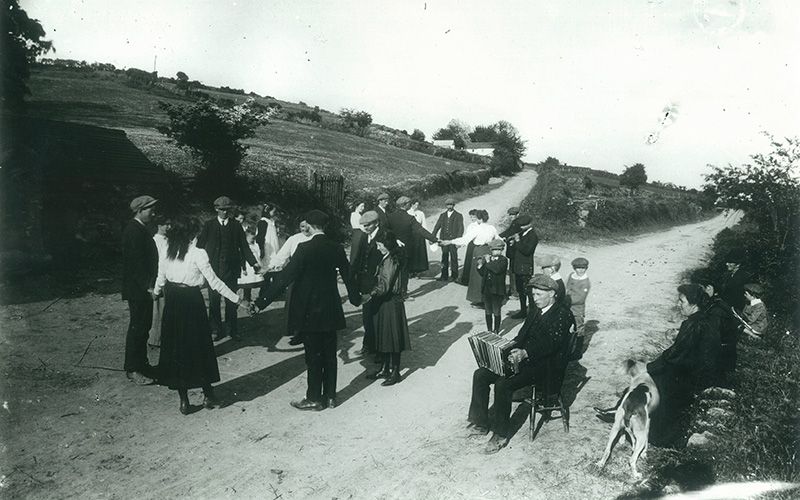
Slides, like polkas, are associated with the music and dance traditions of Sliabh Luachra region (Co. Cork, Kerry, and Limerick). They’re somewhat similar to jigs, but have a very different pulse and energy to them. Rick and Don put this set together, with Rick playing tenor guitar (he learned them on the banjo but we all love the sound of that tenor!)
These tunes, like so many others, have plenty of alternate names. For example, we could just as legitimately have called the set Brosna No.2/The Barrack Hill/Bill The Weaver’s. Tunes are most often learned in sessions, by ear, by trying to snatch a phrase or two each time around until it’s under the fingers. A common response, whenever we’ve asked for the name of a tune, has been “No idea”, but people will often have a name for a tune based on the place or company they were in when they learned it. So things can get confusing!
According to ceolachan on The Session, “Bill ‘The Weaver’ [was] father to brother and sister Denis Murphy & Julia Clifford/Murphy. The O’Keeffe would be Padraig, and they all knew each other…” So there’s that.
12: Reels: Collier’s/Hunter’s House/The Turning of the Tide (118-120 bpm)
James: flute, bodhrán – Morgan: fiddle – Don: mandolin – Rick: guitar
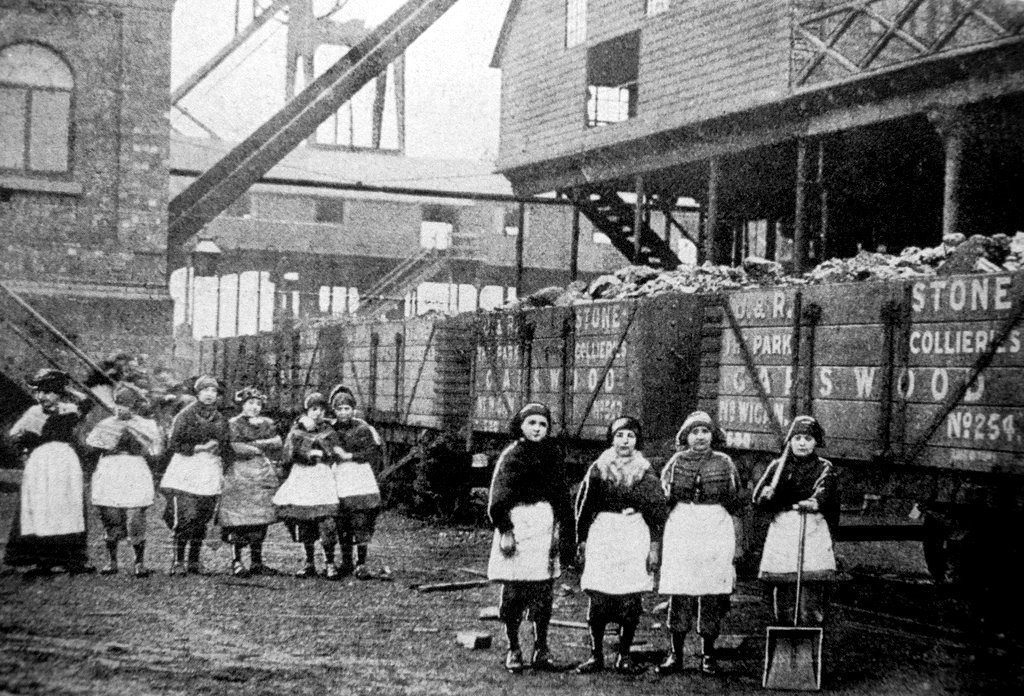
Séamus Connolly suggests this first tune may have come from “the coal mining and musical area of Arigna in County Leitrim.” There’s an older County Leitrim connection, as the reel appears in the c. 1883 music manuscript collection of Gortletteragh, Co. Leitrim by musician Stephen Grier, where it is entitled Hod Carrier’s Reel. (Hod carrying has more to do with the builder’s trade than mining, though) Researcher Conor Ward found a still earlier version in the Philip Carolan music manuscript collection, c. 1860s, of Crossmolina, Co. Mayo, where it was entered as Paddies Welcome Home or The Colier’s Reel. Regardless of its origins, it’s a great tune.
Hunter’s House was composed by fiddler Ed Reavy (1898-1988), who was born in County Cavan but who lived much of his life in Philadelphia, PA. With Maudabawn Chapel, Hunter’s House is his most frequently played tune in the tradition. Ed was another brilliant composer of truly compelling music. The first recording is Sean McGuire’s (Maguire) done in 1956 on a 78 RPM for His Master’s Voice.
The Turning of The Tide is a modern tune composed and played by Maire Breathnach. It’s a beautiful energetic tune that fits seamlessly into the tradition. It serves as a fitting close to a rousing set of reels.
Two or three times a year, we perform with a group of step dancers (most often The Haran Irish Dancers), and working with dancers has definitely influenced the way we play certain pieces. One thing they always need from us are reel sets at a brisk pace. We decided to record this set the way we play it for the dancers, including extra beats for a particular flourish they wanted at the end. James’ drumming in this set was inspired by, and comes closes to replicating, the sound of hard shoe dancers.
13: Jigs: The Belles of Liscaroll/The Monaghan (112-114 bpm)
Morgan: fiddle – Don: mandolin – James: flute – Rick: guitar
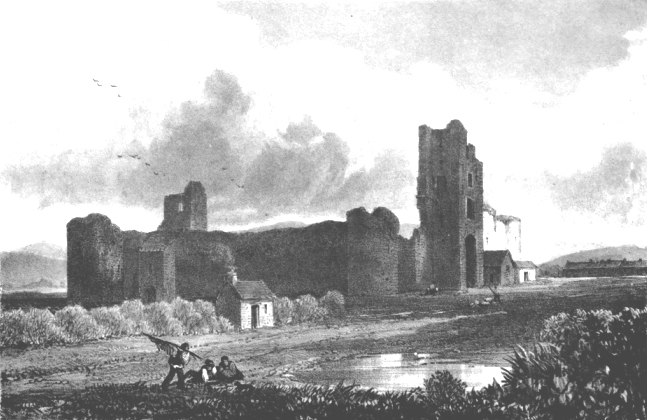
This set gives us goosebumps. We love the wild and dark energy you can tap into when playing these tunes, especially The Monaghan, which is one of Morgan’s favorite jigs. The Belles of Liscarroll, or Walls Of Liscarroll, was first published in Francis O’Neill’s, Dance Music of Ireland: 1001 Gems as early as 1903. It may refer to an old ruined castle that exists on the border of Cork and Kerry.
The Monaghan Jig was collected by County Cork-born John Edward Pigot (1822–1871) and first published 1909. It shows up in an even earlier collection Fifth Collection of Strathspeys, Reels, etc. (Edinburgh, 1809), where it is identified as “Irish”. (This reminds of of a comment we heard recently at a session in Ireland: “We took Scottish music and made it beautiful!”)
It was popularized by Michael Coleman when he recorded it for Columbia in 1921. He added a fourth part that wasn’t included in the earlier collections. Francis O’Neill recorded it on his cylinder recorder in the early 20th century with Patsy Touhey playing it on pipes as Cock Up Your Chin Billy. The mind boggles.
14: Song: Safe Home
By John Smith (Copyright: More Me Gusta Music o/b/o Blue Pine Music)
Don: mandolin, weissenborn, vocals – James: whistle, background vocals – Morgan: fiddle – Rick: guitar, background vocals
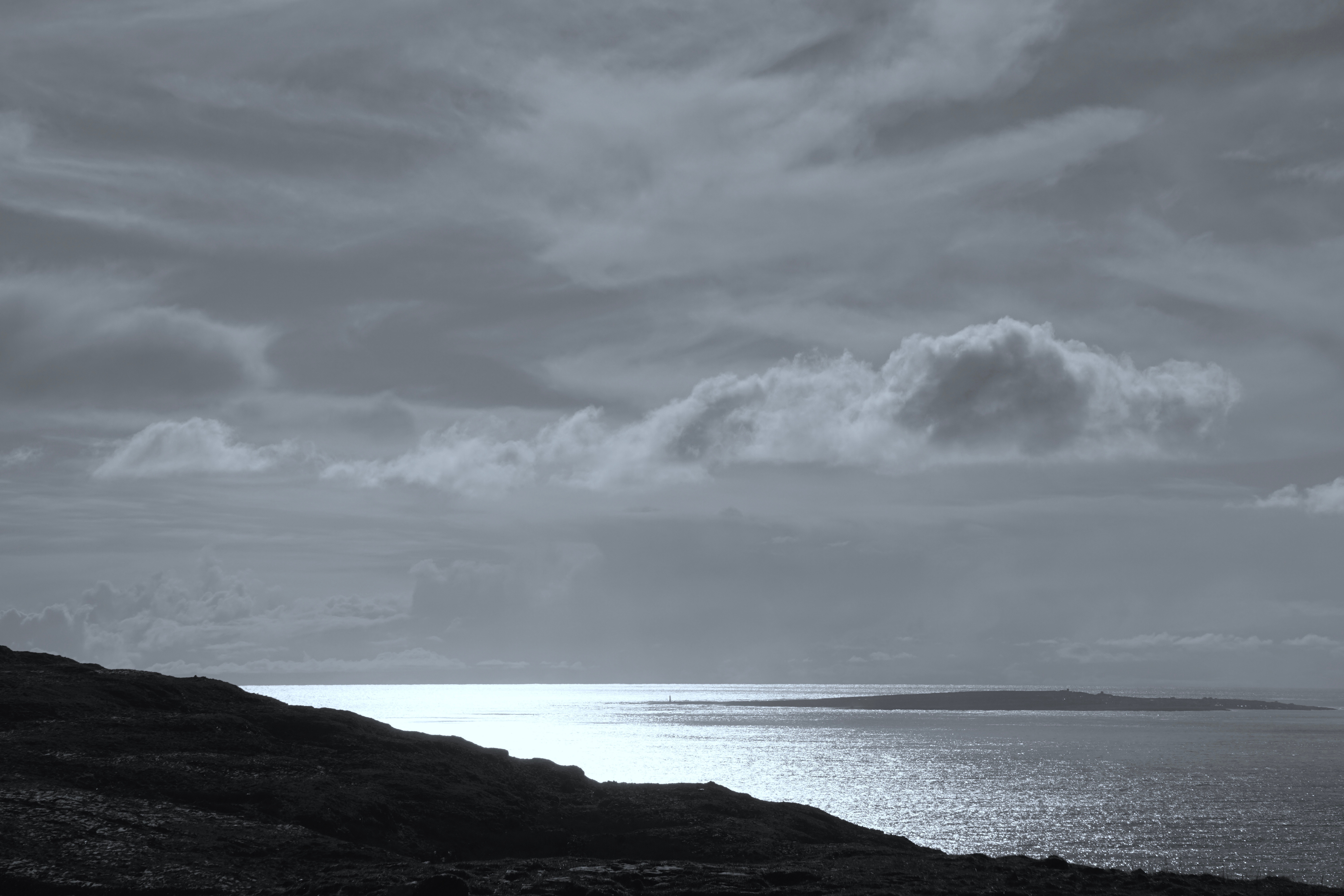
“Safe Home was written by singer/songwriter John Smith and is a lovely snapshot of many a night of playing tunes for dancers and listeners, into the wee hours, then finding your way home. Our good friend Becky told us about this song, saying “you guys should learn this!” Her instincts are generally right on, so I learned the song and the lads put together a beautiful setting.” (Don)
Lyrics:
We’ve come through the valleys, we’ve come through the fields,
We’ve cross over rivers, to find ourselves here.
We sang songs of sorrow, we sang songs of love,
Let’s sing one more together, to send ourselves off.
Safe home, safe home, safe home will you go.
May the light of the moon shine down on your road.
Safe home, safe home, safe home will you go,
Until I next see you, safe home will you go.
We’ve laid down our worries, our troubles, our fears,
Like shells on the strand washed by laughter and tears.
But the tide has returned now, to lift us away,
Back to our houses and families we pray.
Safe home, safe home, safe home will you go.
May the light of the moon shine down on your road.
Safe home, safe home, safe home will you go,
Until I next see you, safe home will you go.
Now the fiddles are quiet, the whistles all still,
Only echoes remain from the jigs and the reels.
The dance floor is empty, our farewells all said.
Now it’s time to be going, till we all meet again.
Safe home, safe home, safe home will you go.
May the light of the moon smile down on your road.
Safe home, safe home, safe home will you go,
Until I next see you, safe home will you go.
….
CD on sale at CDBaby or wherever we play.
